December 18, 2009
Air Date: December 18, 2009
FULL SHOW
SEGMENTS
Climate Deal in Copenhagen?
View the page for this story
President Obama managed to craft a kind of deal at the eleventh hour at the Copenhagen climate summit. Though he called it a meaningful agreement, it fell far short of what some countries had hoped for, and lacked binding targets and deadlines. (06:00)
Many Countries, Many Voices
View the page for this story
Leaders and delegates from vulnerable islands and low-lying countries urge action to save their lands from disaster, but it often seems that self-interest is more powerful. Yet there have been some progress on ways to curb emissions from deforestation and protect the rain-forest. Host Steve Curwood samples opinions from experts in the environmental movement. (12:30)
Danish Values
View the page for this story
It’s cold, it’s dark and it’s one of the happiest places in the world. Steve Curwood asks University of Copenhagen sociologist Peter Gundelach how do the Danes do it? Professor Gundelach says it has to do with finding joy in simple pleasures or as the Danes call it, hygge. (06:00)
City of Cyclists
/ Eileen BolinskyView the page for this story
Bicycles are everywhere in Copenhagen. The city invests heavily in this low-tech mode of transportation – with wide bicycle lanes, car-free streets, and special traffic lights, to make cycling safe, easy and fun. Living on Earth’s Eileen Bolinsky took a ride round the streets. (06:30)
Car Sounds of the Future
View the page for this story
As electric cars gain traction, the world will become a quieter place. But silent vehicles pose a safety threat to pedestrians and cyclists. Host Steve Curwood finds out what the future electronic car might sound like. (04:30)
Show Credits and Funders
Show Transcript
HOST: Steve Curwood
GUESTS: John Prescott,Kevin Knobloch Tony Juniper, Stephanie Tunmore, Emmanuel Seck, Peter Glindelock, Nick Zacharov
REPORTERS: Eileen Bolinsky
CURWOOD: From Public Radio International. This is Living on Earth.
[THEME]
CURWOOD: I’m Steve Curwood… at the UN Climate Conference in Copenhagen. The question - was there to be or not to be a signed climate agreement? The drama played out for two weeks with heads of state and government negotiating down to the wire.
OBAMA: For the first time in history all major economies have come together to accept their responsibility to take action and confront the threat of climate change.
CURWOOD: The deal isn’t the legally binding agreement many nations had hoped for but it keeps the negotiating process moving:
KNOBLAUCH: The president was careful not to overstate what was achieved here it was a first step but it was a first step the us india and china had never taken before.
CURWOOD: Sealing a deal and more from Copenhagen this week on Living on Earth. Stick around!
ANNOUNCER: Support for Living on Earth comes from the National Science Foundation and Stonyfield Farm.
[THEME]
Climate Deal in Copenhagen?

President Obama address the conference in Copenhagen (Photo: Courtesy of COP15)
[CROWD CHEERING / CHANTING]
CURWOOD: From the United Nations Climate Summit negotiations in Copenhagen - this is Living on Earth. I’m Steve Curwood.
Outside the convention hall thousands were arrested throughout the two weeks of intensive, down to the wire negotiations.
Inside things weren’t quite as contentious, but the frustration was palpable. During the final official day U.N. Secretary General Ban Ki-Moon pleaded with the more than 130 heads of state and government who came here to seal a deal.
KI-MOON: The finishing line is in sight, our discussions are bearing fruit. Never has the world united on such a scale. The world’s leaders are all together here. Every sector of society is mobilized, faith groups, CEOs, NGOs, and individual citizens.
The world is watching. Now is your moment. We are united in purpose. Now it is time for us to be united in action, common action. I implore you to seize this opportunity.

Secretary-General of the United Nations, Ban Ki-Moon
CURWOOD: President Obama flew to Copenhagen amid great expectations he could break the deadlock. In the end he did and he didn’t. After hours of closed door negotiations with China, India, South Africa Brazil and the leadership of the African nations, President Obama announced a deal.
OBAMA: Today we've made meaningful and unprecedented -- made a meaningful and unprecedented breakthrough here in Copenhagen. For the first time in history all major economies have come together to accept their responsibility to take action to confront the threat of climate change.20
CURWOOD: The Obama deal would limit global warming to 2 degrees centigrade, it pledges 100 billion dollars a year in aid to help developing nations face the threats and consequences of climate change, and countries would open their doors to the verification of their global warming emissions.
OBAMA: Taken together these actions will help us begin to meet our responsibilities to leave our children and our grandchildren a cleaner and safer planet. Now, this progress did not come easily, and we know that this progress alone is not enough. Going forward, we're going to have to build on the momentum that we've established here in Copenhagen to ensure that international action to significantly reduce emissions is sustained and sufficient over time. We've come a long way, but we have much further to go.
CURWOOD: The long journey began with a first step by China, finally agreeing to scrutiny of its promise to limit emissions. Chinese vice minister of Foreign Affairs, He Yafei spoke on behalf of Premier Wen JiaBoa.
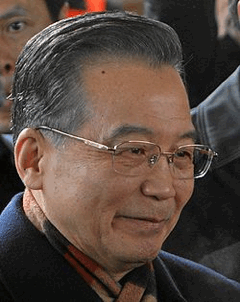
Premier of the State Council of the People's Republic of China, Wen Jiaboa
YAFEI: Action speaks louder than declarations. To increase mutual trust extremely important. We should not go for suspicion, we should not go for confrontation, we should go for cooperation. The action mitigation action we have set for China will be fully guaranteed legally domestically and it will promise to make our actions transparent. And will promise the implementation of these actions will be under the supervision monitoring of the law and by the media.
CURWOOD: Asked about the failure to get a legally binding deal, President Obama said they don’t necessarily offer guarantees.
OBAMA: Kyoto was legally binding and everybody still fell short anyway. And so I think that it's important for us, instead of setting up a bunch of goals that end up just being words on a page and are not met, that we get moving -- everybody is taking as aggressive a set of actions as they can; that there is a sense of mutual obligation and information sharing so that people can see who's serious and who's not; that we strive for more binding agreements over time; and that we just keep moving forward. That's been the main goal that I tried to pursue today.

President Obama address the conference in Copenhagen (Photo: Courtesy of COP15)
CURWOOD: The deal brokered by President Obama formed the core of what’s become known as the Copenhagen Accord, but it squeaked by the UN Conference with the barest of approval. It allows the climate process to keep moving, but did not settle perhaps the most contentious issue--- what happens now to the Kyoto Protocol. Officially Kyoto continues, but its first commitment period setting emission limits for industrial nations ends in 2012. Copenhagen was supposed to settle the issue, but now the decision has been put off.
Kevin Knobloch, president of the Union of Concerned Scientists, came to Copenhagen to follow the negotiations:
KNOBLOCH: It’s not entirely clear what this deal means, it needs to play through a bit more. On it’s surface this deal means that the largest greenhouse gas polluting countries and economies in the world have for the first time stepped up, held hands and made a commitment that they will be part of an international effort to deeply reduce greenhouse gas emissions over the next 40 years.
CURWOOD: Some say the UN process broke down in Copenhagen. How true is that?
KNOBLOCH: I think the UN process did break down. After 2 weeks of intensive negotiation following on 2 years since the Bali mandate of intensive negotiation the elaborate process proved to be too much, such that when over 100 heads of state flew to Copenhagen late in the second week the negotiating delegates were unable to present them a clear negotiated text that they could bring over the finish line.
CURWOOD: With the US getting together with China, India, South Africa, Brazil, who looses?
KNOBLOCH: Well, if this plays out as we deeply hope it wills the fossil fuel industry looses. The fossil fuel industry has been unconscionable in pouring multiple millions of dollars, probably billions of dollars into stretching out the time in which we will reduce our reliance on fossil fuels. And that’s costly time we will never get back again. We know we have this narrow window to get the policy in place to deeply reduce these emissions and every year counts now, every month counts now. And to see the Exxon Mobiles of the world, the American Petroleum Institute, the US Chamber of Commerce throw their back into trying to thwart this international agreement and domestic US policy, as I say, is irredeemable. So, I think if this works, what we’ve seen literally in the last couple of months. China put a greenhouse gas intensity reduction target on the table. India for the first time is say it is going to put national targets on the table and of course the US the president bring 17 percent by 2020 and the 80 percent by 2050 to these talks if we can translate that into a legally binding treaty by Bonn in 6 months or Mexico City by the end of the year at the longest the fossil fuel industry will have lost their bet.
CURWOOD: Let’s talk about domestic politics for a moment here. What does this deal in Copenhagen mean for the 60 votes President Obama is looking for in the Senate on the domestic cap and trade bill?
KNOBLOCH: To get to 60 votes on cap and trade in the senate we really have to convince those swing senators, the fence sitting senators on a couple counts. One is is China going to eat our economic lunch? You know are they going to grow their economy rapidly while ours might be constrained in a carbon constrained world. That’s a big one, competitiveness. And will it hurt the US economy. And I think what this agreement will do is provide some assurance, obviously the details have to be nailed down, it will provide some assurance that in fact those economies will be in a carbon constrained world as ours is.
The other thing that is so clear that is not fully understood I think is in the US and particularly in the Congress is that China is well on its way to transforming its economy into a clean energy economy. We are wringing our hands back home while China is on the march. They have a national renewable energy standard. We don’t yet. They have national fuel economy standards that are more stringent then our recently strengthened ones. China is committed and on its way to building a bullet train network across their nation. Yes, they are building coal plants but the coal plants they’re building are state of the art efficient plants replacing highly polluting plants. The point is once we pass national legislation and the president signs it will now be the policy of the land to transform our economy into a clean energy economy and I think we will see an economic growth and an economic explosion unlike anything we’ve seen in the last century.
CURWOOD: Kevin Knobloch is president of the Union of Concerned Scientists, thank you so much sir.
KNOBLAUCH: You’re very welcome, Steve. Thank you so much.
CURWOOD: Among the many vvips who came to Copenhagen was California governor Arnold Schwartzenegger. He sounded an upbeat note, even as it became clear the Copenhagen Accord would not be the legally binding deal the UN had hoped for.
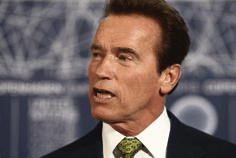
California Governor Arnold Schwarzenegger speaks at the climate negotiations in Copenhagen. (Phto: Courtesy of COP15)
SCHWARZENEGGER: Now, if this conference does not get the strong agreement, some will say that Copenhagen has failed. No, ladies and gentlemen, this conference is automatically and already a success.
Kyoto brought the world's focus to what must be done. It brought the focus to that whole subject. We didn't know then what we know now. We didn't have as much experience with the science that we would research or the hurdles that we would face. But Kyoto made us think differently about the world.
And perhaps the real success of Copenhagen is to give us the opportunity to think differently again. Perhaps the success comes in realizing that something different needs to be done and in fact is already being done. It's being done on the sub-national level.
And I would ask the U.N. to convene a climate summit like Copenhagen but for cities, for states, for provinces and for regions.
And I will be more than happy to host such a summit in California or anywhere else the U.N. wants to hold it, but I recommend strongly in California.
[APPLAUSE]
CURWOOD: California Governor Arnold Schwartzenegger. The next UN Climate Conference will be held next year in Mexico City. But in one sense it has already moved there---in an unusual move the Danish government stepped down early as head of the process and now its Mexico’s turn.
[ACAPELLA SINGING IN COPENHAGEN]
CURWOOD: Just ahead – climate negotiations and the money tree. Keep listening to Living on Earth!
Related link:
United Nations Climate Change Conference
Many Countries, Many Voices
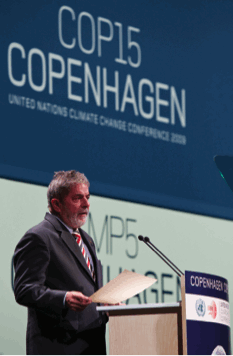
Luiz Inacio Lula da Silva, President of Brazil, address the conference of parties in Copenhagen. (Photo: Courtesy of COP15)
CURWOOD: It’s Living on Earth. I’m Steve Curwood at the U.N. climate summit negotiations in Copenhagen.
Coming up, analysis and some of the speeches from the 130 heads of state or government, who came to the Danish capital to hammer out a climate deal.
But first, for two weeks 18 thousand people, representing more than 190 nations, came together to work, eat, and basically live in the vast Bella Conference Center on the outskirts of Copenhagen. Here are some of their voices:
FUENTES: Me llama Carolina Fuentes, de la nacion de Mexicana. The single most important point, in order to have a strong agreement, we would say financing.
ÅARMARK: My name is Ernst Erich Åarmark from Sweden. The very most important thing is of course to have very stable agreement.
XIAO-YE: My name is Jiang Xiao-Ye with the Chinese delegation.
[XIAO-YE SPEAKING CHINESE]
TRANSLATOR: I think the most important thing is that we hope that every party comes here to achieve an agreement to contribute to the efforts of tackling climate change.
[GUILLAUNE SPEAKING FRENCH]
TRANSLATOR: All states must talk about the future of the world, and not each state and position.
[WOMAN SPEAKING XHOSA]
TRANSLATOR: I think the most important thing is for countries, especially rich countries, to realize and acknowledge the need to support the second world countries.
CURWOOD: Now government climate change experts have been working on an agreement for years. But midway through this historic meeting the cabinet secretaries and ministers took over. And for the last three days the V-V-I-P’s showed up: the presidents, and prime ministers and princes -- each given a few minutes to address the world. Among the first, Charles, the Prince of Wales.
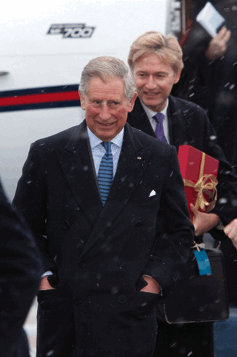
Prince Charles (Photo: Courtesy of COP15)
PRINCE OF WALES: We cannot have capitalism without nature’s capital. We cannot sustain our human economy without sustaining nature’s economy.
CURWOOD: Prince Charles tapped into what was perhaps the most successful part of these negotiations: what’s called REDD, a new U.N. plan that would reduce CO2 emissions from the destruction of the world’s tropical forests.
PRINCE OF WALES: These ecosystems have been described as the planet’s lifebelt and with good reason. Not only do they harbor about half of our terrestrial biodiversity and generate much of the rainfall that is vital for farming, they also absorb and hold vast quantities of carbon that would otherwise be in the atmosphere.
Unfortunately, the forests are being cleared at a terrifying rate. The simple truth is that without a solution to tropical deforestation there is no solution to climate change. As it turns out, it seems that the quickest and most cost effective way to buy time in the battle against catastrophic climate change is to find a way to make the trees worth more alive than dead.
CURWOOD: Tony Juniper helped write Prince Charles’ speech and works for the Prince’s Rainforest Project.
JUNIPER: Prince Charles has been campaigning on these issues for forty years, and the thing that really got him determined to do something about rainforests was meetings he was having with climate scientists in 2007, who said to him that it’s not going to be possible to do a two degree target unless we do something about deforestation.
He looked at the science, he looked at the implications for rainfall for food security – never mind all the issues we know about for wildlife and biodiversity – and also his great respect for the world’s indigenous communities encouraged him to act. And so, he brought together his Rainforest Project, which I’ve been lucky enough to work with these last couple of years, and we’ve been crafting, in hopefully a constructive way, the opportunities for people to come together and form a consensus about how we might proceed, and they’re talking about it here in Copenhagen, and that’s fantastic.
CURWOOD: So, REDD made a lot of advances during the Copenhagen conference of the parties on climate. Why so?
JUNIPER: I think it was one of the things that was inadvertently left out at the time of the Kyoto Summit, when it was decided that avoided deforestation wouldn’t be a part of the process, and there were many different reasons for that. Not least the idea that the industrialized countries should go first in terms of cutting emissions and the tropical countries should be left out of the framework. But I think people have reflected long and hard on this particular subject over those years. And a lot of tropical countries – they actually would like to keep their rainforests and they would like to have that resource there. They’re not clearing them away for reasons that are frivolous, they’re doing it because of the economics of their country’s development pathways, and so they’re having to do it.
They’d rather not do it, and in many cases they thought it was about having a different pathway that could keep one of the principle assets that they have. Namely, these incredible ecosystems that generate rainfall, that harbor biodiversity, that are a potential source of renewable income for centuries into the future. And also, of course, you know, that the western countries are looking for ways in which global emissions could be reduced, without too much pressure on their industrial emissions, it looked like a good deal for them, too.
CURWOOD: President Lulu DeSilva of Brazil spoke to this issue and he put some numbers on the table:
[DESLIVA SPEAKING PORTUGUESE]

Luiz Inacio Lula da Silva, President of Brazil, address the conference of parties in Copenhagen. (Photo: Courtesy of COP15)
TRANSLATOR: The Amazon is a great heritage of the people that live here, and that’s why our commit to reduce its deforestation 80 percent until the year 2020. The Brazilian national congress has just passed my draft bill that has a scent of action that involves fighting deforestation, agriculture, energy, and steel industry. These measures will reduce the growth of Brazilian emissions of greenhouse gas effect between 36 point one percent to 38 point nine percent until the year 2020. This effort will cost us 160 billion dollars, that is to say, 16 billion dollars per year until the year 2020. But this is not a proposal that we’re putting on the bargaining table, this is a commitment that we are taking as a Brazilian nation, and with the world.
CURWOOD: Those numbers you just heard, is that adequate for the job you think that needs to be done?
JUNIPER: We’re certainly getting into the kind of numbers that could make a difference and I think one of the things that has dogged global attempts to slow down deforestation over the years has been the insufficient resources to match the economics that are causing the destruction. This is where the Brazilians have now gone. If you want to match the economic force of the timber demand, soya bean demand, leather and beef demand, you’ve got to match it with and equal and opposite economic force. And that’s why these numbers now are being talked about. I think we are getting into the right kind of ballpark. Whether it’s exactly what the president said, I don’t know, but certainly we’re talking tens of billions rather than handfuls of millions, which is where the world has hitherto been on this subject with project financing, not attacking the strategic underlying economic problems.
So, the fact that the Brazilians are saying this is amazing news for the world, and actually, it sounds like a lot, but it’s possibly the biggest bargain in history, in terms of what we get back for relatively small amounts of money. You know, that’s not even a fraction of what the British government’s just paid to bail out the banking system. This could bailout the entire planet.
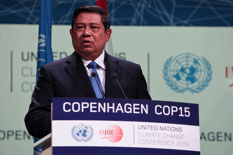
Susilo Bambang Yudhoyono is the president of Indonesia. (Photo: Courtesy of COP15)
CURWOOD: Now, the president of Indonesia put some numbers on the table in terms of reducing emissions. Let’s listen:
PRESIDENT: In the spirit of thinking outside the box, in September of this year, Indonesia declare emissions reduction target of 26 percent from business as usual, by 2020.
This can be increased to 41 percent with enhanced international assistance. As a non-annexed one country we did not have to do this, but we read the scientific warning of the IPCC. So, we set out new reduction target because we wanted to part of the global solution.
CURWOOD: 26 percent reduction in emissions, he says on his own dime, maybe as much as 41 percent if the rest of the world pitches in. How adequate is that compared to the need?
JUNIPER: Again, an amazing offer from a country that’s suffering very high levels of deforestation. And if one looks at the map of global deforestation right now, those two countries in the tropics account for most of it – Brazil and Indonesia. And indeed they’re right up there with the top of the league table of global emitters because of this clearance of land.
So again this is another amazing offer that the world would be foolish to let slip through our fingers at this meeting. If we can find the right kind of mechanism to bring these countries into an agreement. So, we need money now, and it was wonderful yesterday to see a group of countries coming together and saying that they would be prepared to pay in the next few years a substantial sum to countries that are embarking on reversing the deforestation pathways they’ve been on.
CURWOOD: President Obama says that he’ll put up a billion dollars of the three point five billion for this.
JUNIPER: The offer’s been put on the table been helpful. I think they’re still probably at the low end of what’s needed in this next period. There was an informal working group that was convened following a meeting hosted by the Prince of Wales in London in April to look at these very matters of how much money over what time scales – and they came with an estimate that between 15 and 25 billion euros, so more or less dollars the same kind of sums, would be needed between 2010, 2015 to cut down deforestation in the tropics by a quarter.
And so, you know, three and a half billion over the first bit of that five years sounds a little bit on the low side, but it’s good that people are now talking. At least we’ve got a discussion going with the right principles there, i.e., that the West will pay the southern countries for slowing down their deforestation as a matter of principle in terms of keeping those ecological services in tact. It’s not going to be linked to a carbon market, at least not now; it’s not going to be linked to any other conditionalities, it’s a way of helping the world cope with this big problem, and being done in a way that hopefully could deliver some quite big benefits.
CURWOOD: Now, what about the indigenous people? In Brazil, for example, some three percent of the population – indigenistas – are responsible for 25 percent of the land, and they’ve perhaps taken the best care of the land.
JUNIPER: The indigenous people are absolutely crucial to this in so many respects. And I think, you know, respect’s number one is the fact that history shows they are the best custodians of the land. If you look at a map of Brazil and the areas of deforestation that have occurred over the last fifty years or so, and look at where the intact forest remains – there is almost a 100 percent correlation to where the indigenous reserves are and where the rainforest is.
These people have managed to maintain the forest, not only because they have an indigenous title there that’s in a legal deed. These people have a very different view of the world; they see the forest as a scared presence that’s sustaining their culture in a very fundamental and spiritual way.
They don’t see the forest as a source of natural resources, which is just about how everybody else sees it. Looking at it from a more kind of human rights point of view, these people have to be part of the process, because like everybody else they have to have a voice in something that fundamentally affects them.
And so, that then is where it gets very complicated because lots of countries have different relationships with their indigenous people. In New Guinea, perhaps you have one of the best examples of where the indigenous people still control the forest. In other countries the indigenous people, you know, are not legally recognized. And I’ve heard Malaysian ministers saying that over the years, for example.
So I think the indigenous thing will probably have to be on a case-by-case, country-by-country approach, but I think if the donor community is having a conversation with the individual rainforest countries this is one of the things they really must bring to the table.
CURWOOD: Tony Juniper, with the Prince’s Rainforest Project, thank you so much.
JUNIPER: Thank you very much, indeed.
CURWOOD: Many leaders made impassioned speeches in Copenhagen. Here’s one from the President of the Republic of Maldives, Mohammed Nasheed.
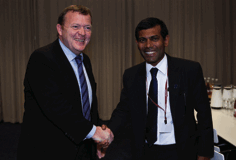
The prime minister of Denmark, Lars Lokke Rasmussen greets Mohamed Nasheed, president of the Maldives. (Photo: Courtesy of COP15)
NASHEED: Climate change negotiations have nothing – nothing at all to do with money. Maldives is a very small state. We have never received aid from European Union countries. Whatever we’ve been able to do we have been able to do with our friends and neighbors, and we have been able to fend for ourselves. Climate change negotiations have for me and for our country everything to do with our grandchildren. I have two daughters – I want to see grandchildren. If we continue business as usual we will not be able to see our grandchildren. To assume that climate change has anything to do with money is in my mind the height of arrogance.
CURWOOD: I discussed President Nasheed’s remarks with Stephanie Tunmore. She’s an organizer with Greenpeace International.
TUNMORE: I think that the president from the Maldives gave, as usual, a very emotional speech. And it’s a very emotional issue for small island states, and for low-lying delta areas. Because basically, they’re negotiating their survival, this is not just an exercise in moving chess pieces around a board for them. And as one of the island representatives said, they could become stateless by the middle of this century. That’s something that I think that people in the industrialized world can’t even contemplate, that they would lose their home, the land, have nothing and nowhere to go.
CURWOOD: The Prime Minister of Marshall Islands is feeling a lot of frustration that this process has not yielded enough to really protect the Marshall Islands. He’s talking about going to the international court of justice; he says, now, that his country is the subject of environmental crimes.

The low lying atoll nation of Maldives is immediately threatened by sea level rise. (Photo: Wikipedia)
TUNMORE: I feel his pain. I really do. I think it’s an indictment of the industrialized world that he feels compelled to do that, to seek justice through the courts. And it is criminal, the way that the rich countries are behaving. They created the problem, we’ve had negotiations now since Kyoto, since 1997, we’ve had a four-year process followed by a two-year process where countries have constantly committed to doing things that they end up not doing. And I think we’re seeing desperation now from those countries that they’re fighting for their survival – there’s no question.
CURWOOD: At the end of this process we don’t have the United States, China, all the nations of the world bound to a legally obligating instrument. How does this play for the small island states?
TUNMORE: I think you have to look at, for instance, the Bali Action Plan. That was a political agreement, and what happened? Pretty much nothing. There’s no trust left in this process, and the only way to make sure what is promised is delivered is to have something that’s legally binding. We need a treaty. We need an agreement where promises made are promises kept.
CURWOOD: Stephanie Tunmore with Greenpeace. Thank you so much.
TUNMORE: Thank you very much.
CURWOOD: Promises made, promises broken. That was the message from the president of the West African nation of Senegal, Abdoulaye Wade.
[WADE SPEAKING FRENCH]
TRANSLATOR: When I talk about promises I can say that I’ve attended many G8 meetings. If I count up all the sums promised it’s at least 200 billion dollars. Where are they? And when have they been implemented? That’s why I’d like to say that it’s all very well to have discussions, but I’d like to come down to our experience in Senegal. I don’t want to wait for promises any longer, I want to seek original solutions and as the great Greek philosopher said, I want to prove movement by actually walking. That is to get down to business.
SECK: I think that he’s right. It was a real speech. He say what coming from his soul.
CURWOOD: Emmanuel Seck is with Environmental Development Action in the Third World. He’s based in Dakar, Senegal. I asked him what he thought of President Wade’s speech.
SECK: He said that he will not talk about money. He will talk about what we can do, and what we are doing. We’ll not wait; we’ll do our development ourself. If they want to come and join us, we will walk together with them, and I think that it is the sense of his message. People are talking about the many promises, we’ll do that, we’ll put this on the table. So, all developed countries, many of them have promised to give a lot of money, but we are a little bit tired with these promises.
And then, we set up African local communities, let’s go together, let’s build on what we know and what we have, and then if someone want to join us, that will be a good thing.
CURWOOD: The president of Senegal says he’s starting an organization called Science Without Borders. What do you know about this, and what do you think it will try to do?
SECK: You know, we have, we are stricken by arid land degradation, we stricken by droughts. And then there are many scientists, for example, from Australia, some scientists from Israel, also who have made a lot of research in the desert. And if these people are ever able to join the process in Africa, they are welcome.
I think that it is this to get together all people are leading volunteer and who will – who are willing to work with Africa without any penny. We have many scientists in Africa, we have many engineer in Africa, we have also only to organize them and have good politics, good politics to bring them together, and to give them confidence that they could work for the countries and for their continent.
CURWOOD: Thank you so much, Emmanuel Seck is with Environment and Development in the third world, from Senegal.
SECK: It’s my pleasure.
Related links:
- United Nations REDD Program
- The Prince’s Rainforest Project
- Environmental Development Action in the Third World
[MUSIC: Organ Grinder music recorded on the streets of Copenhagen]
CURWOOD: Coming up, the secrets of why the Danes are the happiest people on the planet. Stay tuned to Living on Earth.
ANNOUNCER: Support for the environmental health desk at Living On Earth comes from the Cedar Tree Foundation. Support also comes from the Richard and Rhoda Goldman fund for coverage of population and the environment. And from Gilman Ordway for coverage of conservation and environmental change. This is Living On Earth on PRI, Public Radio International.
Danish Values
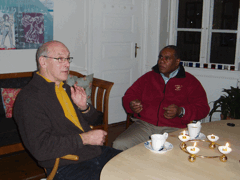
Copenhagen sociologist Peter Gundelach and host Steve Curwood enjoy some Danish hygge. (Photo: Eileen Bolinsky)
CURWOOD: It’s Living on Earth, I’m Steve Curwood at the U.N. Climate Conference in Copenhagen, Denmark.
At this time of year, the city is cold and snowy, and the sun sets at around three in the afternoon. In many places this would be a recipe for gloom and grumpiness, but not here in Denmark. In fact, numerous studies indicate Danes are the happiest people on the planet. Here, like in much of Europe, salaries and the standard of living are high, and violent crime and corruption are low. But, the Danes say it’s not money that buys happiness. They sum up their secret in a difficult to define Danish word:
WOMAN: Hygge is when you turn on – you light the candles. It’s warm, you have some chocolate, you’re with people you love. It’s like you’re just mmm! It’s just mmm! [Laughs]
Yeah, that’s kind of it.
CURWOOD: We tried out a bit of hygge ourselves. We invited University of Copenhagen Sociologist Peter Glindelock to the apartment where we’re staying downtown.
[SOUNDS OF CLINKING CUPS]
CURWOOD: Professor Glindelock has conducted numerous studies on why Danes are so happy. And over a cup of coffee…
GLINDELOCK: It’s called hygge, hygge, which is – Danes like to say it’s not possible to translate that into other languages, but it’s something like coziness – to be in your home, as we’re having our cup of coffee, talking with friends. I think everybody’s doing it actually in the all countries, but the Danes really like to think that it’s something special for them.
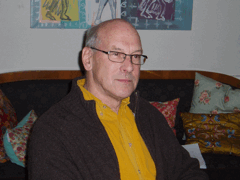
Sociology professor Peter Gundelach (Photo: Eileen Bolinsky)
CURWOOD: Denmark scores often at the top of the list of people here being very happy. Americans might look at the Danes being so happy and say, oh, it’s all part of their social system because they have education and health – all that’s taken care of, that’s why they’re so happy. What would you say?
GLINDELOCK: I think that’s probably part of it. The happiness standard is the quality of life in different societies. And Denmark scores very highly on all those different values, so even though the climate is poor, which is part of that analysis it still shows that the welfare state is very important for people’s happiness.
CURWOOD: So, the welfare state is part of the happiness, but not the true secret to Danish happiness because you Danes do better than other similar European countries. So, you can tell us…what is the secret to Danish happiness?
GLINDELOCK: The difference we really found between the Eastern European welfare state was that Danes score much higher on various kinds of social ties. So, they are closer to their family, to their colleagues, to their friends. They meet more often.
And they argue that they have – they have more to do with each other. So, we believe that the character of the social ties is very important. And these social ties are, sort of horizontal. In the sense that it’s on equal terms, and not vertical in relationships.
And a lot of theory says that if social ties are horizontal it creates social trust and also happiness. So, this is – if there is a secret, this is probably it.
CURWOOD: So, how do you characterize this Danish social connectivity?

Copenhagen sociologist Peter Gundelach and host Steve Curwood enjoy some Danish hygge. (Photo: Eileen Bolinsky)
GLINDELOCK: One way of characterizing it is to call it collective individualism in the sense that people like to be something special, but at the same time they like to be very connected.
So, we have this welfare state, the whole system is working in a very collective way. But still people like to be individuals, so if we were to ask people to choose between equality and freedom, they will choose freedom, but still they – it’s such a homogenous society so the way people are expressing their freedom is identical in a sense, but still they like to do both; they like to have a strong collective system and be able to show that they can do something by themselves.
CURWOOD: What problems do you have? In particular, what problems do you have around immigration – people who try to come into this society?
GLINDELOCK: Yes, well, you might say that’s the other side of the coin. I mean, some many say that Denmark is like a tribe, so it’s – everybody knows each other, have the same names, they live in the same neighborhood, so to speak, in a small country. And this means it’s a very close-knit society, but the other side of the coin is that it’s difficult to get access into that society. And in particular, immigrants have had hard times doing that. It’s becoming better now, but for many years it was very a problem.
CURWOOD: It seems to me that taxes are very high here, in Denmark, compared to other places. Now, in America, high taxes – politicians would get voted right out of office, and yet, this society supports them, why?
GLINDELOCK: Having the salary as tax in Denmark, and people are quite happy about it. I mean, whenever you start up a list, and you ask people, would you like taxes to be lower. They won’t say they like to have high taxes, but they prefer high taxes to lower taxes if it means that they can have a well-functioning welfare state.
And in Denmark, everything is sort of state-controlled – the hospitals, the schools, everything is controlled by the local government or the central government – we pay for this in our taxes.
And this kind of welfare state means that everybody gets more or less the same from the state. At least what the Danes like, they like an egalitarian society.
CURWOOD: Peter Glindelock is professor of sociology at the University of Copenhagen. Thank you so much.
GLINDELOCK: Thank you. It was a pleasure.
Related links:
- Professor Peter Gundelach's webpage
- Happiness and Life Satiffaction in Advanced European Countries by Peter Gundelach and Svend Kreiner
City of Cyclists
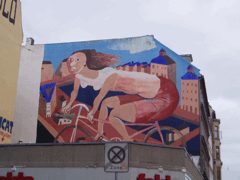
Cycling is everywhere in Copenhagen. (Photo: Eileen Bolinsky)
CURWOOD: Where the rubber meets the road, it’s usually cars that rule, but in Copenhagen, bicycles are king. More than one in three residents cycle to work or school, making this one of the top cycling cities in the world.
Living on Earth’s Eileen Bolinsky went for a spin.
[SOUNDS OF THE STREET]
BOLINSKY: Bicycles are everywhere in Copenhagen. On the streets, on the subways, leaning against buildings, parked on sidewalks.
KASTRUP: Everyone bicycles in Copenhagen.
BOLINSKY: That’s Marie Kastrup. Cycling’s a huge part of her life; she’s the project manager for the city’s bicycle secretariat.
KASTRUP: So, I bicycle to work everyday, every time I go visit my grandmother I take my bicycle, when I go do my shopping, everything is done by bike.
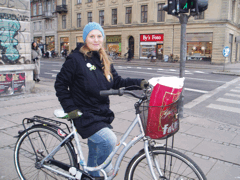
Marie Castrop bikes everywhere in Copenhagen (Photo: Eileen Bolinsky)
BOLINSKY: Day or night, rain, wind, cold - Copenhageners pedal three-quarters of a million miles each year. But that’s not the way it was before the oil embargo in 1973. Back then just about all of Denmark’s oil came from the Middle East.
KASTRUP: It has to do with the epic public demand in the 70s because of the oil crisis back then, that the politicians in Denmark and Copenhagen started to prioritize cycling and without the massive political investments in cycling, we couldn’t have gotten as far as we are now.
BOLINSKY: You won’t find much spandex or fancy biking gear in this city. Most bikes are sturdy – you might say clunkers – with guards that protect business suits and dresses from a greasy chain. Cycling is simply a part of everyday life here in Denmark.
KASTRUP: It’s just something that you do because it’s the obvious mode of transport. It’s not a part of your identity.
BOLINSKY: It’s definitely not a part of mine, but I wanted to check it out for myself.
KASTRUP: Right now we’re going towards the busiest place in Copenhagen for cyclists. It’s a bridge that connects the medieval center of Copenhagen with the more residential quarters of neighborhoods of Copenhagen.
BOLINSKY: Okay, shall we go?
KASTRUP: Let’s go.
[SOUNDS OF GETTING ON BICYCLE]
BOLINSKY: I haven’t been on a bike in years. In Boston, where I live, the busy streets make biking downright dangerous.
BOLINSKY: Okay, I’m not used to these back brakes. I had them as a kid.
KASTRUP: Just take your time.
BOLINSKY: Getting back on a bike is like, well, getting back on a bike.
Copenhagen’s streets are flat so riding is easy here. There are eight-foot wide bike paths – or tracks – between the sidewalk and parked cars so riders are protected.
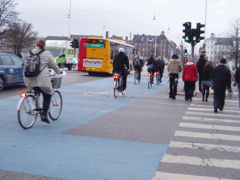
(Photo: Eileen Bolinsky)
KASTRUP: Here we have to cross and turn too. First, we have to look out for cyclists.
[SOUNDS OF BUSY INTERSECTION]
BOLINSKY: At a busy intersection, trucks and cars zip by quickly – and so do bicycles. Copenhagen’s city planners are trying a number of experiments to make cycling even faster, safer and easier.
KASTRUP: To the left we can see a piece of the square where we made this experiment with some yellow lines crossing the pavement actually.
BOLINSKY: Usually, it’s illegal for bike riders to cross over a sidewalk. The yellow lines allow cyclists to take a shortcut without a penalty.
KASTRUP: And instead of just handing out a lot of fines we wanted to accommodate these cyclists that really needed a shortcut. And it actually does work. We haven’t seen any accidents between pedestrians and cyclists.
[SOUNDS OF TRAFFIC CONTINUE]
KASTRUP: Another thing we did was to implement green traffic waves for cyclists, which means that you don’t have to stop at red lights at intersections, so the traffic lights are actually following the cyclists instead of the cars.
BOLINSKY: These traffic lights are timed to give priority to bikes during rush hour. 36,000 cyclists pass through this part of town every day.
KASTRUP: Now we will cross the bridge and go out of Norrelbrogade where you can see some more details of the traffic experiments.

Cycling is everywhere in Copenhagen. (Photo: Eileen Bolinsky)
BOLINSKY: Since there are twice as many cyclists as drivers in this part of Copenhagen, some of the streets are closed to cars.
KASTRUP: The cars took up more than two-thirds of the space on the street so we thought why not make the allocation of space reflect the actual use? And so, as you can see we doubled the cycle track which then reduced the space for cars so that there was more space for cyclists and it actually worked.
BOLINSKY: There are 217 miles of bike tracks in Copenhagen, plus 25 miles of tree-lined cycle routes that crisscross in the city center. They’re reserved only for bikes and pedestrians and there are plans for even more.
KASTRUP: In Copenhagen investing in cycling is not just for the bicycles, it’s to make a better city. And in the city center we just have too much congestion if we want to have cars for everyone so the bicycle is a very space economic mode of transport.
BOLINSKY: And people in Copenhagen who choose pedal power are an enthusiastic bunch.
MALE: It’s economical. Its best for our little economy, so we just use the bike.
OLDER WOMAN: It’s easier to get around. Also, it costs a lot of money to take the bus. Then it’s for free and easy.
WOMAN: It’s freedom. You can get anywhere you want in a very short amount of time. And you get exercise, and you get fresh air, and all the good environmental stuff as well.
BOLINSKY: In Copenhagen’s harbor is a statue of the city’s icon – it’s Hans Christian Andersen’s Little Mermaid. But now, the city’s bicycle project manager, Marie Kastrup, says Copenhagen has a new symbol.
KASTRUP: The bicycle girl is this cultural icon in Denmark, it sort of represents this healthy, authentic, happy, active woman, which is a symbol of Denmark. It’s the freedom you can have on a bicycle, and also sort of a healthy, democratic feeling that everyone is free to go on the bicycle and do whatever they want.
BOLINSKY: And what Copenhagen wants is to have half its residents commuting by bicycle in five years.
[SOUNDS OF SQUEAKY BICYCLE]
BOLINSKY: Pedaling the streets of Copenhagen, for Living on Earth, I’m Eileen Bolinsky.
[SOUND OF BICYCLE BELL RINGING TWICE]
Related links:
- Copenhagen: City of Cyclists Bicycle Account 2008
- City of Cyclists Copenhagen Bicycle Life
Car Sounds of the Future

Nick Zacharov is head of Delta Consultancy's SenseLab (Photo: Bruce Gellerman)
CURWOOD: A bicycle needs a bell to warn others on the road because it’s so quiet, and as it turns out, electric cars and some hybrids might need something similar.
Now, a bell for a car seems, well, undignified and a constant horn is annoying, so that’s where Nick Zacharov comes in. He set up a computer at a green technology expo during the climate talks here in Copenhagen to poll people about what should be the sounds of the car of the future.
I asked Nick why electric cars need a special noise.
ZACHAROV: Well, the main issue is that under 25 kilometers an hour they are essentially silent vehicles to pedestrians and cyclists, and actually there’s a larger instance of accidents with hybrid cars at low speeds than with normal combustion engine. Because we expect a car to make a sound. So now we’re considering – we’ve been trying to raise the issue in the debate about what should an electric vehicle sound like in the future.
And we’ve set up a listening test with some different types of sounds to actually gauge consumer opinion about how an electric car should sound and what we should be designing for.
CURWOOD: All right, well can you show me what you’ve been working on?
ZACHAROV: Yeah, sure. What we have here is we have a number of sounds which have been designed by sound designers. I’ll go through, let’s say, some of the more irritating or alarming sounds…
CURWOOD: Okay, let’s start here with – this is your lowest-rated sound it looks like on your chart. You call it “Emission Free”. Can I take a listen?
ZACHAROV: Yeah.
[SOUND OF SCI-FI ENGINE HUMMING]
CURWOOD: Kind of sounds like another planet.
ZACHAROV: Yeah, exactly. We might not want our cities populated with this sound. Uh, okay…
[SOUNDS OF DEEP-WATER SONAR PINGS]
CURWOOD: Sounds like a submarine.
ZACHAROV: Exactly.

Nick Zacharov is head of Delta Consultancy's SenseLab (Photo: Bruce Gellerman)
CURWOOD: So, now you’re going to take us to a few better things.
ZACHAROV: I think we’ll try and do that.
[SOUNDS OF IMITATED WIND, SOLAR WINDS]
ZACHAROV: A bit more subtle – these are things we may have seen in movies with futuristic cars.
CURWOOD: Well, I think I like this a little bit more than the others that I’ve heard so far.
ZACHAROV: I wouldn’t disagree with you. And, as we see this is starting to get moderately reasonable scores, and also we have to look at the context it will be used in. So, a sound like that will be used outdoors where there is wind, so a sound like that might be very subtle, but it’s not going to be very audible.
CURWOOD: Well, look, Nick. You know, I can say this to you confidentially, one of the problems with an electric car is it has this image of, you know, kind of a neutered, nerdy, no-kind-of-fun thing.
And in America, at least, you know, we’ve been advertised to that it’s not just, excuse me, it’s not just your car, it’s your freedom!
ZACHAROV: We do see that they’re – that is the sort of image that the vehicles have mostly today, but we also see that they are some sports electric vehicles being developed. And these are actually very futuristic, very powerful, very and – in a way – I’m might say, macho. They’re giving us a strong and powerful message through their sound.
[SOUND OF LOUD TIRES ON ROAD]
CURWOOD: Well, now that is rather loud tire noise or something.
ZACHAROV: Basically, yes.
[SOUND CONTINUES]
ZACHAROV: There is a rhythmic pattern there. It is very subtle.
The next noise, which is the most preferred one, overall. And this study’s been done with 270 people, but yesterday when we actually looked at the data we have about 500 ratings now from the website.
[SOUNDS OF RHYTHMIC TIRES ON ROAD]
ZACHAROV: The patterning is something we would pick up on very well. The brain is very skilled at finding patterns in sound.
[SOUNDS OF CROWD]
CURWOOD: Why not just make it sound like a car?
ZACHAROV: Yeah, that is one of the options!
[SOUND OF CAR ENGINE STARTING]
ZACHAROV: We can also think, that is that the message that an electric car wants to give? To pretend to be a combustion engine vehicle, or could we have something a bit more high-tech that gives actually a very positive feeling and a positive meaning, as well as adding the safety value.
[SOUND A ENGINE REVVING HIGH]
WOMAN: You are exceeding the speed limit.
ZACHAROV: And there is a big debate: should they be silent, or not? We believe that form and function are important and the sound is an important safety matter.
CURWOOD: So, silence is golden, but…
ZACHAROV: Silence is golden, but so is safety.
CURWOOD: Nick Zacharov is with SenseLab, developing a sound for the electric car. Thanks so much, Nick!
ZACHAROV: Thank you.

Every day, precisely at noon, the Royal Danish Guard marches from their barracks to relieve the soldiers stationed at the Palace
CURWOOD: To vote on your favorite electric car sound, or even suggest one, go to our website LOE dot org.
Change has been the watchword here at the U.N. Climate Conference in Copenhagen. Climate change, of course. Change in the way we use energy. Change in the way nations develop. But amid all this change we found one thing in Copenhagen that started in the 1600s and has remained constant over the centuries: the changing of the royal Danish guard.
[SOUNDS OF BAND PLAYING]
CURWOOD: Precisely at noon, seven days a week, no matter what the weather, the Danish royal guard marches from barracks to palace – some things never change.
[BAND CONTINUES]
Related links:
- Electric Car Sound Online Poll
- Senselab
CURWOOD: Living on Earth is produced by the World Media Foundation.
Our crew includes Bobby Bascomb, Eileen Bolinsky, Bruce Gellerman, Ingrid Lobet, Helen Palmer, Jessica Ilyse Smith, Ike Sriskanderajah, Mitra Taj, and Jeff Young, with help from Sarah Calkins, Annie Glausser, Marilyn Govoni, Sammy Souza and Jennifer Stevens. Our interns are Quincy Campbell and Nirja Parekh. Jeff Turton is our technical director. Alison Lirish Dean composed our themes. You can find us anytime at LOE dot org. From Copenhagen, Denmark, I’m Steve Curwood. Thanks for listening.
[BAND CONTINUES]
ANNOUNCER: Funding for Living On Earth comes from the National Science Foundation supporting coverage of emerging science. And, Stonyfield Farm, organic yogurt and smoothies. Stonyfield pays its farmers not to use artificial growth hormones on their cows. Details at Stonyfield dot com. Support also comes from you, our listeners. The Ford Foundation, The Town Creek Foundation, The Oak Foundation—supporting coverage of climate change and marine issues. And Pax World Mutual Funds, socially and environmentally sustainable investing. Pax world for tomorrow. On the web at pax world dot com.
ANNOUNCER 2: PRI – Public Radio International.
Living on Earth wants to hear from you!
Living on Earth
62 Calef Highway, Suite 212
Lee, NH 03861
Telephone: 617-287-4121
E-mail: comments@loe.org
Newsletter [Click here]
Donate to Living on Earth!
Living on Earth is an independent media program and relies entirely on contributions from listeners and institutions supporting public service. Please donate now to preserve an independent environmental voice.
NewsletterLiving on Earth offers a weekly delivery of the show's rundown to your mailbox. Sign up for our newsletter today!
 Sailors For The Sea: Be the change you want to sea.
Sailors For The Sea: Be the change you want to sea.
 The Grantham Foundation for the Protection of the Environment: Committed to protecting and improving the health of the global environment.
The Grantham Foundation for the Protection of the Environment: Committed to protecting and improving the health of the global environment.
 Contribute to Living on Earth and receive, as our gift to you, an archival print of one of Mark Seth Lender's extraordinary wildlife photographs. Follow the link to see Mark's current collection of photographs.
Contribute to Living on Earth and receive, as our gift to you, an archival print of one of Mark Seth Lender's extraordinary wildlife photographs. Follow the link to see Mark's current collection of photographs.
 Buy a signed copy of Mark Seth Lender's book Smeagull the Seagull & support Living on Earth
Buy a signed copy of Mark Seth Lender's book Smeagull the Seagull & support Living on Earth

